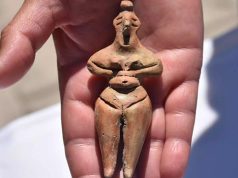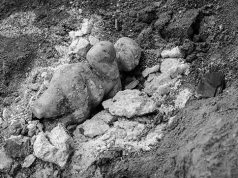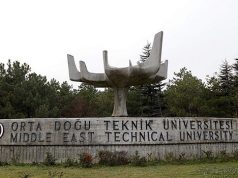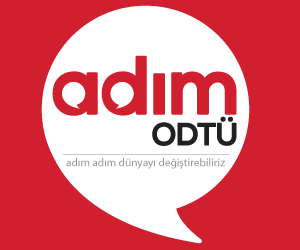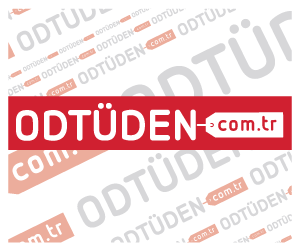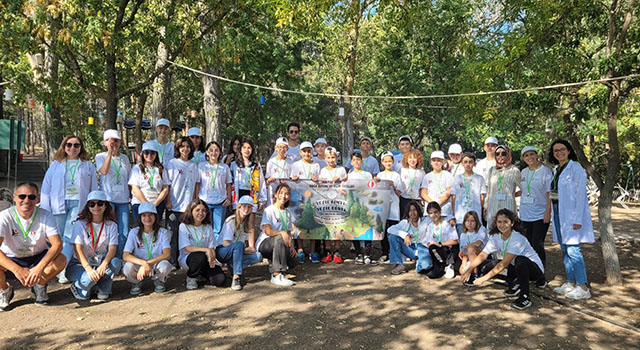
The Green Chemistry: Green Earth project, supported under the TÜBİTAK 4004 Nature Education and Science Schools, was held between September 2-6. Led by Chemist Sevil Erkut from METU Central Laboratory on behalf of METU, the project involved 25 seventh-grade students selected from secondary schools affiliated with the Ministry of National Education and located in Çankaya, Ankara. The Green Chemistry: Green Earth project, conducted under METU’s coordination, was also supported by Petrol Ofisi and the Ministry of National Education, Çankaya Directorate of National Education.
The project addressed topics such as the application of green chemistry principles in daily life choices, waste management, and sustainable living practices through a combination of experimental and observational activities, alongside diverse learning methods. The project aimed to increase environmental awareness and foster greater sensitivity and responsibility towards environmental issues through an intensive five-day program.
Day 1
On the first day of the program, participants had the opportunity to get to know each other before engaging in the Emotional Islands drama activity. In this activity, they performed a drama based on their interests and favorite things that they liked, allowing them to better connect with their friends with whom they would spend the entire week. Following the drama activity led by Assoc. Prof. Pervin Oya Taneri, participants listened to Assoc. Prof. Salih Özçubukçu’s presentation on the basics of Green Chemistry. Then, as part of the activity titled “I Wrote a Poem for My Green World,” participants composed poems together with Literature Teacher Özlem Göktaş by utilizing the knowledge they gained from the chemistry presentation.
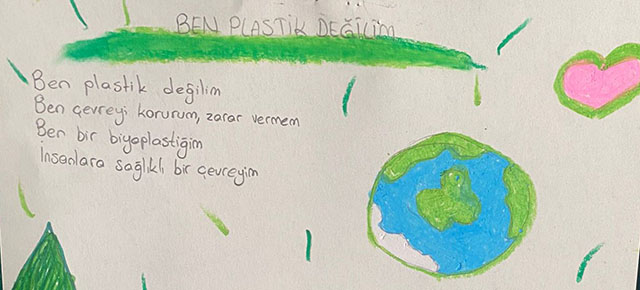
Later in the day, participants took part in the “Bioplastic Production” workshop, where they created biodegradable plastic with Chemist Fulya Karahan Dağ, further raising their awareness of environmental responsibility.
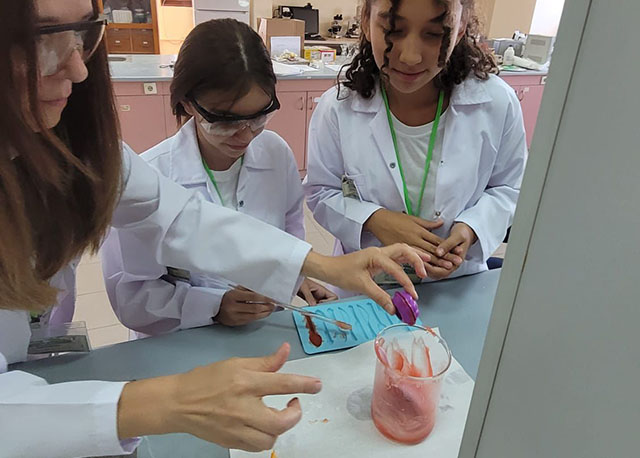
Day 2
On the second day, students explored elements through augmented reality (AR). As part of this activity, elements were examined in 3D using AR element cards and a mobile app, and thus a potentially hazardous laboratory experiment was successfully conducted in a virtual environment using AR. The “Learning About Elements with AR Application” activity, presented by Chemist Mete Esencan, became one of the activities that attracted the most attention from students.
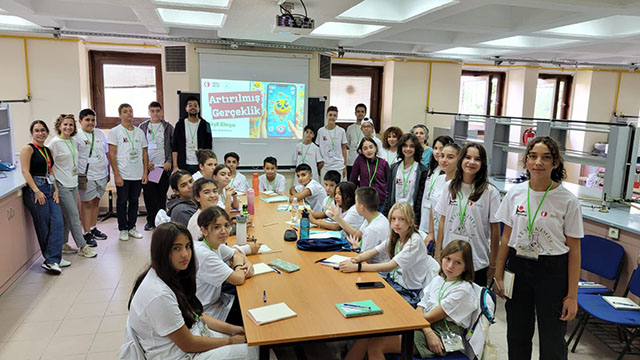
In the “Soap Foam Comparison Experiment,” the foam produced by synthetic soap containing harmful chemicals was compared with the foam of a naturally sourced, traditionally made soap, highlighting the differences in their ingredients. Based on the information provided by Chemistry Teacher Nazlıcan Demirkıran, participants discussed whether pleasant scent and foam are desirable qualities in hand and body cleaning products. Afterwards, students made glue using natural and commonly available household materials.
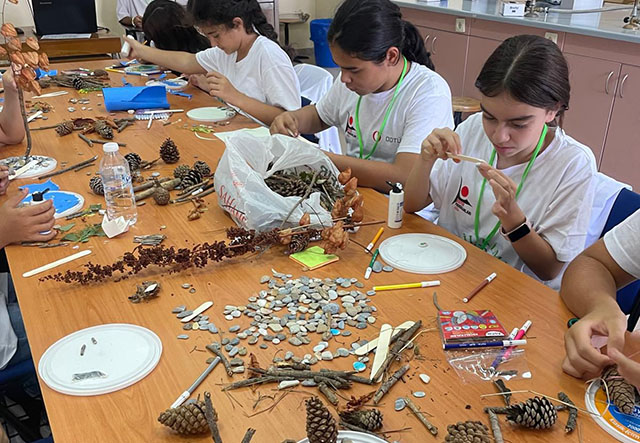
In the “Heroes of Recycling” activity, students worked with Visual Arts Teacher Semiha Seda Terzi and used this glue to design mini paintings with recycled materials.
Day 3
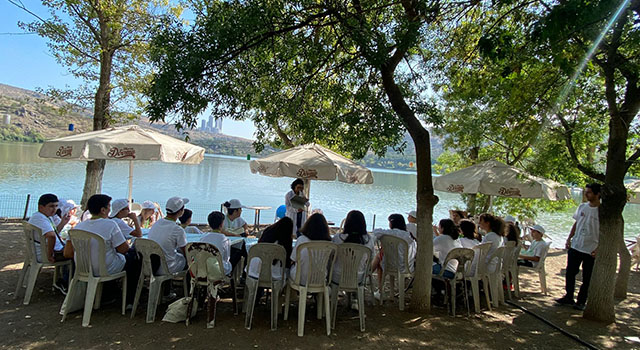
The third day, which consisted of fieldwork activities at Lake Eymir, started with a presentation on waste delivered by Lect. Dr. Eda Tuna Öztürk. Then, the students participated in the “pH Measurement in Drinking Water and Wastewater” activity to conduct pH measurements under the guidance of trainers. Using pH strips, the participants measured the pH of various samples such as drinking water, vinegar, and purple cabbage juice, and conducted professional measurements using a pH meter. This activity also addressed the toxic effects of chemicals and how chemicals, when mixed with water, can alter its pH levels to the degrees it is no longer healthy for the human body.
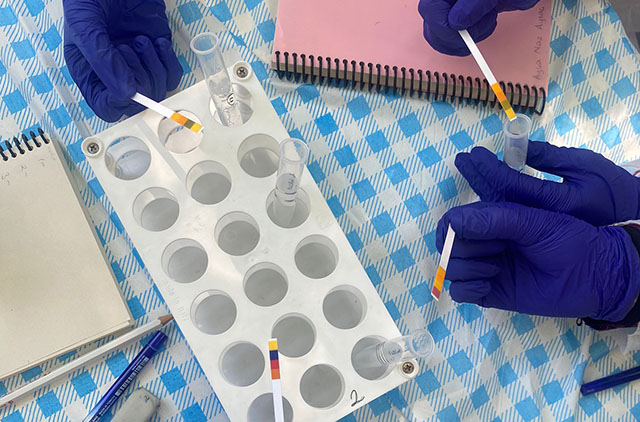
Later, in the “Nature’s Filter” activity, students filtered wastewater using sand and particles collected from the surroundings to produce clean water together with Lect. Dr. Tuğba Doğan. Charcoal as activated carbon, fine sand, cotton, and small stones were used to make filters. Students learnt the roles of the materials used in their filters in the process of purifying the water through this hands-on experience.
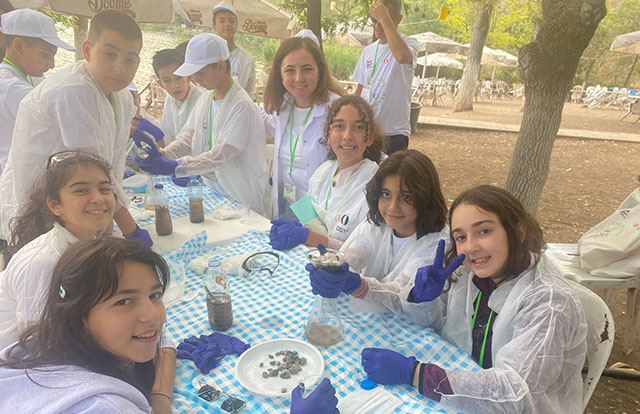
In the “What’s Natural? Let’s Think It Through” activity, chemical substances with clean and eco-friendly properties along with their characteristics were introduced to the participants, who were then asked to create products they could use in their daily lives from these materials. As part of the activity, participants made natural products such as roll-on deodorants, moisturizing hand cream, and disinfectants by using ingredients like baking soda, coconut oil, natural essential oils, vinegar, and turmeric. The final activity to mark the end of the day was the “Green Chemistry Kahoot Quiz,” conducted by Lect. Dr. İ. Cihan Ayanoğlu. A quiz on Green Chemistry was held via the digital learning and entertainment platform Kahoot, and the students ranking in the top three were awarded.
Day 4
On the fourth day of the program, participants took part in two consecutive activities to prepare plant-based dyes and use these dyes to create designs on fabric bags. In the dye preparation stage, Res. Asst. Ece Ayça Erdoğan guided the participants to make colorful liquids using materials such as spinach, onion skins, turmeric, purple cabbage, hibiscus, and basil. Then, students enjoyed a design activity using these natural dyes that posed no harm to their skin or respiratory systems.
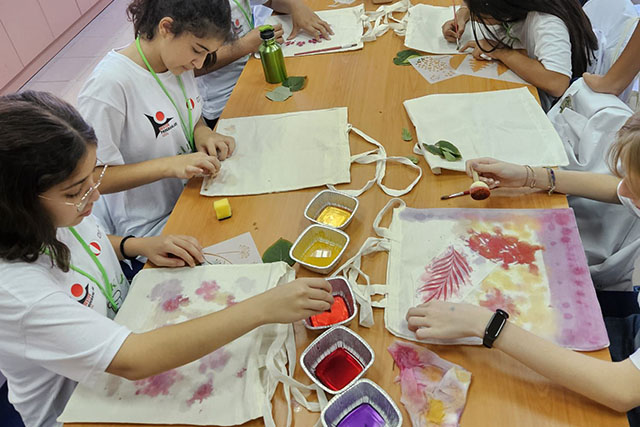
Another activity of the fourth day, “Green Orienteering,” involved a game where students reinforced their knowledge on Green Chemistry by answering questions at orienteering checkpoints. Under the supervision of Sports Coordinator Özgür Norman, students enthusiastically took part in the activity, navigating by using maps to find the checkpoints and enjoying the experience. Lastly, in the “Let’s Make Seed Balls” activity, participants were informed about seed balls. The effects of seed balls on nature, climate, and the future of the planet were discussed, after which the students worked together to make seed balls.
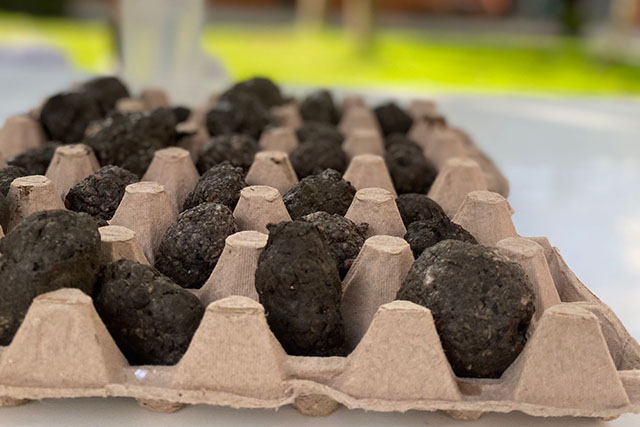
Day 5
The final day of the program began with the “Biomimicry Presentation” and the “Card Matching Game” prepared by Chemist Sevil Erkut. Participants learnt about the concept of biomimicry, which involves imitating models, systems, and elements found in nature to solve complex human problems. The presentation helped students recognize the wise guidance that nature offers. Examples of nature-inspired designs were also highlighted. Following the presentation, a contest was held where students, divided into groups, played a card matching game featuring images of designs inspired by nature.
In the afternoon, an exhibition was organized to showcase the work students had completed throughout the activities in the program. METU President Prof. Ahmet Yozgatlıgil visited the exhibition, where he viewed the works of students and spoke to them to learn more about their projects.
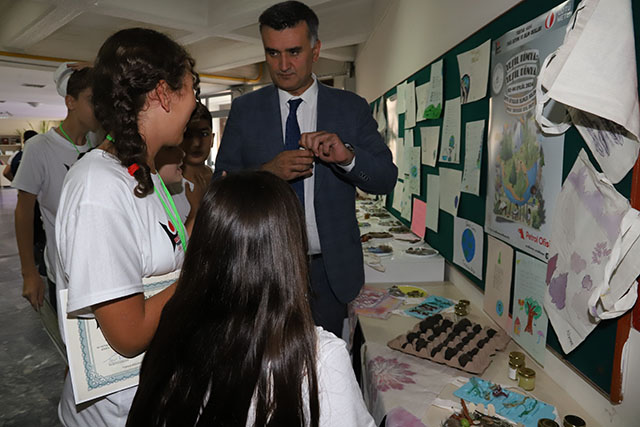
Finally, in the closing event of the Green Chemistry: Green Earth project, Prof. Yozgatlıgil presented certificates to the participants and the project team.
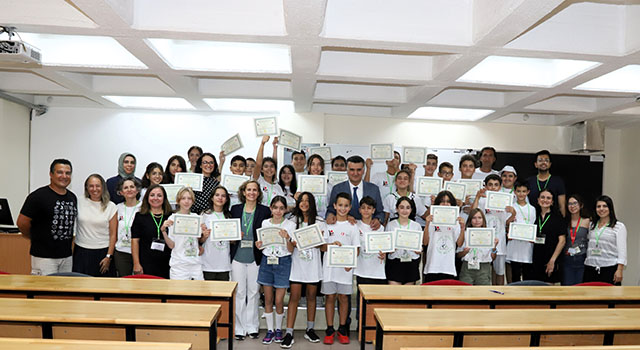
The project, led by Sevil Erkut from the METU Central Laboratory, included Assoc. Prof. Pervin Oya Taneri from the Department of Educational Sciences, Assoc. Prof. Salih Özçubukçu from the Department of Chemistry, and Özlem Göktaş from the Ministry of National Education as experts. Lect. Dr. Eda Tuna Öztürk, Lect. Dr. Tuğba Doğan, Lect. Dr. İ. Cihan Ayanoğlu, Res. Asst. Ece Ayça Erdoğan, Chemist Dr. Fulya Karahan Dağ, Chemist Mete Esencan, Chemistry Teacher Nazlıcan Demirkıran, Visual Arts Teacher Semiha Seda Terzi, and Sports Coordinator Özgür Norman participated in the project as trainers. Nurse Nilgün Koçak contributed to the project as a nurse, while Eda Durkan, Tezcan Seymenler, Melisa Şalk, Deniz Erkut, and Abdussamed Turabi served as project guides.



